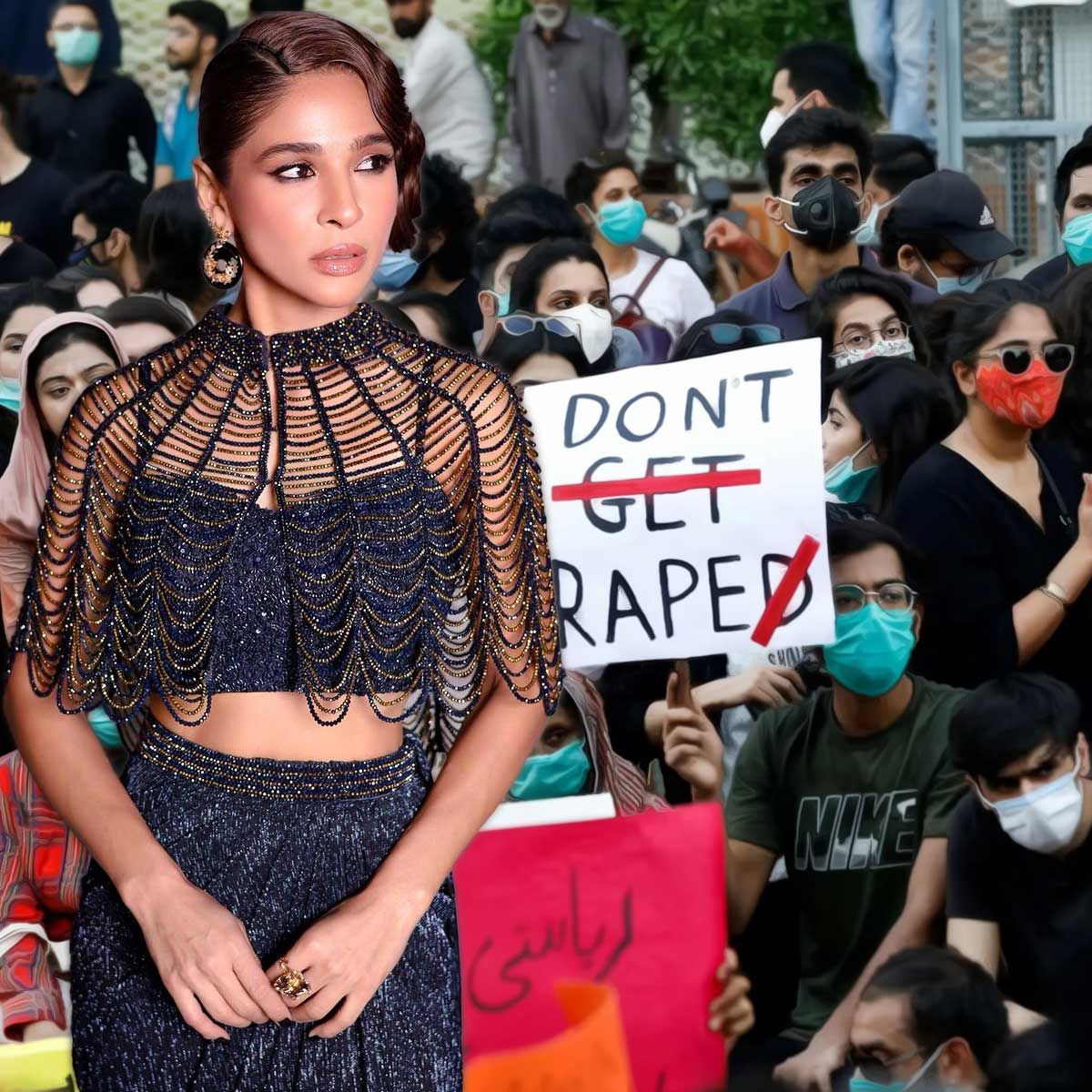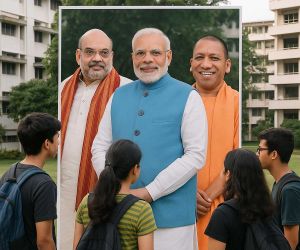MORE COVERAGE
Twitter Coverage
Satyaagrah
Written on
Satyaagrah
Written on
Satyaagrah
Written on
Satyaagrah
Written on
Satyaagrah
Written on
JOIN SATYAAGRAH SOCIAL MEDIA
"ख़ौफ भी ऐसा है साहब, कह नहीं पाएंगे हम, भूलकर भी कह दिया तो जान से जाएंगे हम": Pakistani actress Ayesha Omar exposes the ugly truth of her country, says "I don’t feel safe here, can’t even go to a park without ten people following you or catcalling you"

In a recent revelation that has sparked widespread attention, the renowned Pakistani actress and YouTuber Ayesha Omar courageously opened up about the daunting challenges women face in Pakistan. During her appearance on the Adnan Faisal Podcast, Omar shared her personal experiences, shedding light on a significant societal issue that has long plagued the country.
Omar, known for her bold and impactful roles in Pakistani cinema, discussed the distressing reality that women in Pakistan often confront. She spoke candidly about her early encounters with harassment, an issue that unfortunately remains pervasive in many parts of the country. Her statements resonate with the experiences of numerous women who navigate similar situations daily.
Highlighting a critical concern, Omar pointed out the alarming lack of safe public spaces for women in Pakistan. This issue, as she described, extends beyond mere inconvenience; it represents a fundamental barrier to the freedom and security that every individual deserves. The actress emphasized that even routine activities, such as going to a park, are marred by the fear of harassment, underscoring a deeply ingrained societal problem.
In a poignant admission, Omar expressed her feelings of insecurity within her own homeland. This sentiment, coming from a prominent public figure, reflects the broader climate of fear and uncertainty that pervades the streets and roads of Pakistan. Her words not only capture her personal struggle but also echo the collective anxiety that many Pakistani women endure in their daily lives.
Omar's statements on the podcast have thus brought to the forefront a critical issue that demands immediate attention and action. By sharing her experiences, she has opened a window into the harsh realities faced by women in Pakistan, a truth that can no longer be ignored or overlooked. Her courage in speaking out serves as a call to action, urging society to recognize and address the challenges that women face in ensuring their safety and dignity.
|
In a further disheartening revelation, Pakistani actress Ayesha Omar shared her contemplation of leaving her homeland, driven by the deteriorating economic situation and the precarious state of women's safety in Pakistan. Her statement, "I don’t feel safe here. I want to be able to walk on the road. It’s a basic human need to be able to walk outside in the open air," poignantly captures the essence of her distress. Omar emphasizes the fundamental right to freedom of movement, a right that seems to be unjustly compromised for women in Pakistan.
Her words, "All these women in your office, can you guys walk on the street? Isn’t that sad? I don’t want to sit in a car. I want to cycle. Why can’t I ride a bike," reflect a profound frustration with the status quo. Omar laments the restrictions imposed on women's mobility and independence in the Islamic Republic. Her desire to engage in simple activities like cycling or walking freely on the streets, which many take for granted, highlights the severe limitations faced by women in her country.
Omar then delved into the unique adversities Pakistani women encounter. She pointed out the deep-seated disparity in understanding between the experiences of men and women in Pakistan. Omar stated, "Men can never understand what Pakistani women grow up with. As much as you try, you cannot." This statement sheds light on the fundamental differences in the lived experiences of men and women, rooted in societal norms and expectations.
|
Her further elaboration, "Because of the fear that a woman has in this country, sure, he who has daughters may understand. Being in a woman’s shoes and understanding that is impossible. You’re anxious every second," underscores the constant state of vigilance and anxiety that women endure. Omar suggests that while men, especially those with daughters, might sympathize, they can never fully comprehend the perpetual sense of fear and apprehension that accompanies women throughout their lives in Pakistan.
These candid reflections from Ayesha Omar reveal a distressing reality about the societal and cultural challenges faced by women in Pakistan. Her words not only highlight her personal struggles but also resonate with the experiences of countless women in the country, who face similar fears and restrictions in their everyday lives.
In her continuing discourse on the plight of women in Pakistan, actress Ayesha Omar emphasized the essential human rights of safety and freedom. She expressed a deep-seated desire for a future where women in her country can move about without fear. Omar poignantly asked, “When will the time come when I can roam freely in my country? Without the fear of being kidnapped, without the fear of being raped, without the fear of being mugged. It’s a basic human need. Freedom and safety.” This statement underscores her longing for a society where the fundamental needs for freedom and safety are met, a society where women can live without the constant dread of abduction, sexual assault, or robbery.
Omar acknowledged that crime is a universal issue, not unique to Pakistan. However, she called for a significant shift in societal attitudes and the creation of a safer environment. Her focus was particularly on the need for women to be able to walk on the streets without fear. This is not just a call for better law enforcement but also a call for a change in cultural norms and perceptions that often restrict women's freedom and safety.
|
She further reinforced her message by sharing personal experiences of being followed, catcalled, and harassed. These stories were not just her own but mirrored the experiences of countless women who face similar harassment in public spaces. By sharing these experiences, Omar aimed to highlight the distressing reality that women face when trying to simply enjoy public settings. Her narration of these incidents serves to bring attention to the pervasive issue of harassment that women face, emphasizing the urgent need for societal change.
In her heartfelt and stirring conclusion, Pakistani actress Ayesha Omar touched upon the pervasive issue of crime and harassment that women face in her country. Omar stated, “There is crime in every country in the world. But people can, at least, walk on the road. You can’t even go to the park without ten people following you or catcalling you. They say weird things, they try to touch you. What do you do? What do you do,” conveying a sense of helplessness and frustration. This statement reflects the severe limitations on women's freedom of movement in Pakistan, where even basic activities like walking in a park are marred by fear and harassment. Omar's rhetorical question, "What do you do?" underscores the lack of viable options or protection available to women facing such situations.
Omar further observed, “We can go to the enclosed places but not everyone can afford access to these alternative spaces.” She highlighted the economic disparity that affects women's access to safer environments. While some women might find refuge in private, secure areas, this is not a feasible solution for everyone, especially those who cannot afford such exclusivity. This remark underlines the need for safe public spaces that are accessible to all women, regardless of their economic status.
|
In a personal revelation, Omar shared an unsettling experience involving the cook of her neighbour, who made unwelcome attempts to touch her. This incident, even in what is considered a 'posh' or upscale area, demonstrates that the issue of harassment transcends socio-economic boundaries and can occur anywhere. Omar's statement that she feels frightened even in affluent areas further emphasizes the pervasive nature of this problem.
Omar also shared that during the COVID-19 lockdown, she found a rare sense of comfort in walking around the city. This period, marked by reduced public activity, unexpectedly provided her with a brief respite from the usual fears and anxieties associated with public spaces.
Finally, Omar disclosed that her mother intends to leave the country, reflecting the severity of the situation and its impact on personal decisions. Moreover, her brother, who was born in Pakistan, now resides in Denmark. This move by a family member highlights the extent to which safety concerns can influence life-altering decisions and lead individuals to seek refuge in other countries.
Throughout her discussion, Ayesha Omar poignantly brought to light the stark realities faced by women in Pakistan. Her candid expressions of fear, frustration, and the desire for change echo the sentiments of many women in similar situations. Her words not only reveal the distressing state of women's safety in Pakistan but also serve as a powerful call for societal transformation and the establishment of a secure environment where women can live freely and without fear.
 Support Us
Support Us
Satyagraha was born from the heart of our land, with an undying aim to unveil the true essence of Bharat. It seeks to illuminate the hidden tales of our valiant freedom fighters and the rich chronicles that haven't yet sung their complete melody in the mainstream.
While platforms like NDTV and 'The Wire' effortlessly garner funds under the banner of safeguarding democracy, we at Satyagraha walk a different path. Our strength and resonance come from you. In this journey to weave a stronger Bharat, every little contribution amplifies our voice. Let's come together, contribute as you can, and champion the true spirit of our nation.
 |  |  |
| ICICI Bank of Satyaagrah | Razorpay Bank of Satyaagrah | PayPal Bank of Satyaagrah - For International Payments |
If all above doesn't work, then try the LINK below:
Please share the article on other platforms
DISCLAIMER: The author is solely responsible for the views expressed in this article. The author carries the responsibility for citing and/or licensing of images utilized within the text. The website also frequently uses non-commercial images for representational purposes only in line with the article. We are not responsible for the authenticity of such images. If some images have a copyright issue, we request the person/entity to contact us at This email address is being protected from spambots. You need JavaScript enabled to view it. and we will take the necessary actions to resolve the issue.
Related Articles
- Taliban cuts Pakistan’s barbed-wire erected on Durand Line and took it to Afghanistan
- "Compassion has enemies, and those enemies are things like pity, moral outrage, fear": India calls on Pakistan to protect minorities after killing of Hindu woman Daya Bheel in Sindh province, her body was severed, breasts chopped and was beheaded
- Supported the United States-led ‘war on terror’ in Afghanistan for ‘dollars’ and not in “public interest”: PM Imran Khan regrets
- India successfully carried out the test firing of a new missile of the Agni series known as Agni-Prime
- "Poverty is not just a statistic; it's a lived reality": World Bank report reveals that 95 million Pakistanis are living below the poverty line, amid rising inflation, the institution emphasizes the need for urgent reforms to stabilize Pakistan's economy
- "हो, मुहंजो खट्टी आयो खेर सां हो जमालो" | Dive into the tale of 'Hojamalo', a Sindhi folk song born from bravery that celebrates Jamalo Sheedi's fearless act on the Lansdowne Bridge, blending history with melody in a tribute to courage & cultural heritage
- Violence Against Minority Hindus in Bangladesh: The Mistier World Of Silence
- ‘Love Jihad’ Rears Its Ugly Head? Tamil Hindu Girl, Abducted And Converted By Muslim Extremists, Among SL Blast Suspects
- "When life hands you lemons, make beef stew": In a flavorful twist, cash-strapped Pakistan's media grumbles over the 'beef-less' banquet for their cricket team in Hyderabad, perhaps the World Cup campaign is as much about palates as it is about wickets
- "However deep you dig a well it affords no refuge in the time of flood": Half of Pakistan is under water which led to the catastrophic floods and claimed more than 1000 lives, emergency declared as a deadly flood affected more than 33 million people
- Direct Action Day triggers The Great Calcutta Killings: Kolkata Paid Its Lives To Create Pakistan
- UP Anti-Terrorism Squad arrests Bangladeshi national Talha Bin Farookh from Darul Uloom Deoband with fake documents: Major jolt to terrorism and anti-Bharat sleeper cells
- "Anyone can speak Troll. All you have to do is point and grunt": Weeks after Alt news co-founder got out on bail, #ArrestZubair trends again as Mohammed Zubair works in tandem with Pakistan to build “Khalistan” narrative against cricketer Arshdeep Singh
- Speech of Sardar Patel at Calcutta Maidan in 1948 busts the myth of ‘Muslims chose India’ and is relevant even today
- "Peace goes into the making of a poem as flour goes into the making of bread": Pakistan flour crisis worsens; prices skyrocket amidst wheat shortage, Stampedes all across country reported whereas as per Global Hunger Index rank Pakistan: 99 India: 107

























